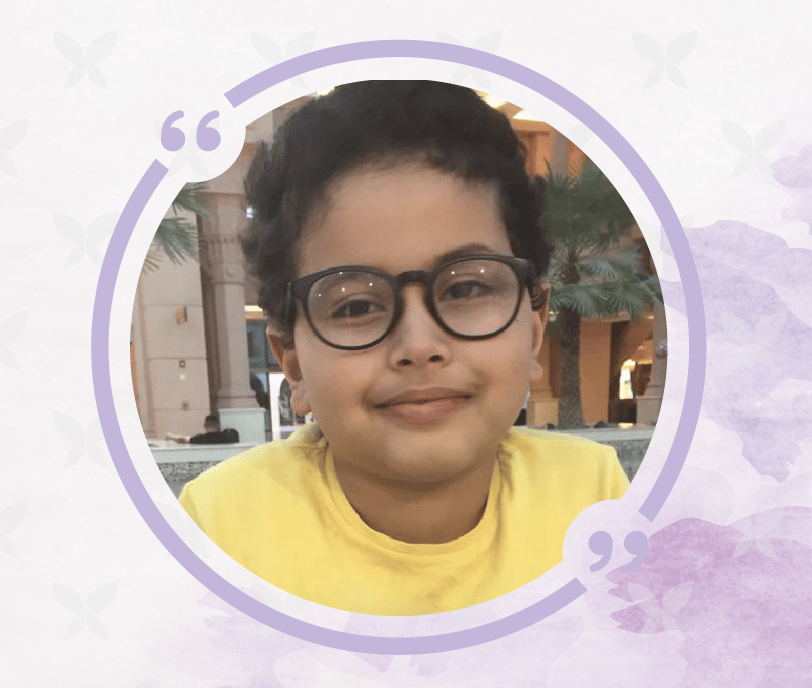“QCS” treatment for Children with cancer helps parents to support them
Feras’s story is not simply the story of one child. Feras’s story is one of family, resilience, and kindness in the face of childhood cancer. This is a story of how he, along with his mother, father, and brother, faced the diagnosis together and overcame what they believe is a test from God.
Feras is a gentle, shy 8-year-old. He’s in the 2nd grade, and his favorite subject is math. When he grows up, he wants to be an astronaut. He loves playing with his brother and is the best goalie on the team. His mom says he has always been a gentle soul, but you can see his excitement as he teases his older brother.
The story began when Firas had spiked fevers every few weeks that would then subside on their own. On Friday, February 26th, 2016 (his father remembers the day vividly), they took Feras to the pediatric emergency center because he had developed a stiff neck along with his fever. Blood was drawn, and Feras was kept for observation overnight.
From February to October 2016, Feras went into and out of the hospital. He suffered through the side effects of the chemotherapy and steroids and developed a central line infection that required four procedures to place and replace the port. His final chemotherapy doses needed him to sit still in bed for 36 hours straight.
While the doctors expected an infection, the blood results revealed otherwise. A doctor came in to explain that the blood results showed an alarming abnormality in the number of white blood cells; the body’s major line of defense against infection with Leukemia was among the most likely explanations. Feras was transferred to Hamad General Hospital. With Feras on his lap in the ambulance, Ashraf, Feras’s father, tried to make sense of his son’s diagnosis, hoping it was all a mistake.
The family made it to Hamad General Hospital, where they were taken to the hematology ward. Touria, Feras’s mother, immediately noticed the children with IV lines and those who had lost their hair, and the sight of it all overwhelmed her. Within a day, their world was turned upside down.
Feras and his family also remember the good parts of their journey. They remember a special doctor, Dr. Salwa, who explained their son’s condition most kindly and delicately. She sat beside Feras in his hospital room as she went through the course of treatment to come, which included months of chemotherapy, multiple lumbar punctures and scans, and surgeries to place a central line. She listened to their questions. She listened to Feras. Having received bits of information throughout the evening, she finally put the family at ease. “She was a person before she was a doctor, and it showed in her actions,” Ashraf explained.
They remember the speed at which they received a diagnosis and treatment for their son here in Qatar, for which they are grateful. Anywhere else, getting a hospital bed and starting treatment would have taken weeks, if not months.
They remember the social worker who helped them with the financial burden of the diagnosis. Ashraf recalls from his colleague soon after the diagnosis that the treatment would cost him thousands of riyals. The financial burden added colossal stress. However, this burden vanished once their social worker connected them with the Qatar Cancer Society. “Qatar Cancer Society relieved 75% of the stress we were going through,” Ashraf explained, and “we could truly focus on helping our son get better, rather than the logistics of providing his day-to-day treatments. We are so grateful for their help,” he continued.
And they remember the people who stood beside them–the colleagues, neighbors, and family who went out of their way to help care for Feras and his brother, Tamim. They helped cover shifts for Touria when she missed work, cooked for Tamim when no one was home, and took turns visiting the hospital. They made spending two very lonely Eid holidays a little better while Feras was scheduled for chemotherapy. It was only through visits with friends, who came with food and high spirits, that they could get through this.
Now, four years on, Feras remembers a few details. He remembers making a friend at the hospital, a young girl with same cancer. He also remembers the toys his brother would bring him, the pain of the central line, and spending a lot of time in a hospital bed. But even as he describes these painful memories, he is a cheerful young boy. When his mother tears up, he whispers to her: “Don’t let sadness destroy you, be patient.”

